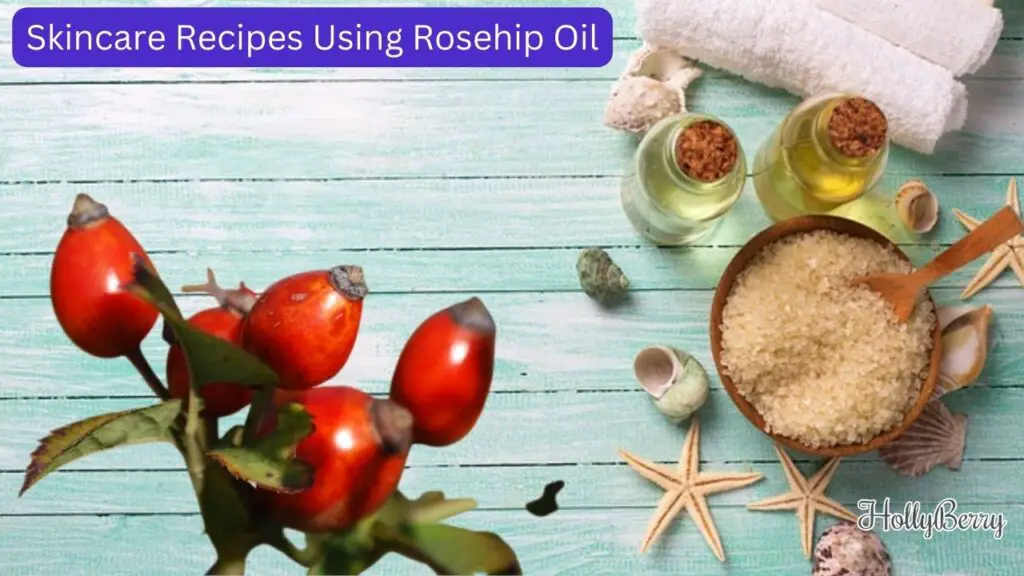
Rosehip oil, derived from the seeds of wild rose bushes, has become a popular ingredient in skincare products due to its numerous benefits. This versatile oil is packed with nourishing components, making it perfect for all skin types and concerns.
In this article, we’ll explore the benefits of rosehip oil for your skin, discuss how to choose a high-quality rosehip oil, and share some easy DIY skincare recipes to create your own rosehip oil-infused products at home.
Benefits of Rosehip Oil for Skin
Rosehip oil is a powerhouse of skin-loving nutrients that can help improve your skin’s overall health and appearance. Let’s dive into some of its key benefits:
Fatty Acids
Rosehip oil is rich in essential fatty acids, particularly omega-3 and omega-6. These fatty acids help to maintain the skin’s natural moisture barrier, preventing water loss and providing hydration. They also have anti-inflammatory properties, making rosehip oil an excellent choice for soothing irritated or sensitive skin.
Antioxidants
Rosehip oil contains a high concentration of antioxidants, including vitamin C and vitamin E. These antioxidants help protect the skin from free radical damage caused by environmental factors, such as pollution and UV rays.
They also contribute to a brighter, more even complexion by reducing hyperpigmentation and promoting collagen production.
Vitamin A
Rosehip oil is a natural source of vitamin A, which is known for its ability to promote cell turnover and increase collagen production. This makes it particularly effective for addressing signs of ageing, such as fine lines and wrinkles.
Choosing High-Quality Rosehip Oil
When purchasing rosehip oil for your DIY skincare recipes, it’s essential to choose a high-quality, cold-pressed, and organic product.
This ensures that the oil retains its full range of nutrients and benefits. Look for oils packaged in dark, amber-coloured bottles, as this helps protect the oil from light, which can degrade its quality over time.
Top DIY Rosehip Oil Skincare Recipes
With a better understanding of rosehip oil’s benefits and how to select a high-quality product, let’s dive into some simple and effective DIY skincare recipes using this fantastic ingredient:
Rosehip Oil Facial Serum
Combine 2 tablespoons of rosehip oil, 1 tablespoon of jojoba oil, and 5 drops of lavender essential oil in a small, dark-colored glass bottle.
Shake well to mix the ingredients.
Apply a few drops to your face and neck after cleansing and toning, gently massaging the serum into your skin. Use daily for best results.
Rosehip Oil Moisturizer
In a small bowl, mix 1/4 cup of shea butter, 2 tablespoons of rosehip oil, and 1 tablespoon of coconut oil.
Whip the mixture using a hand mixer or a whisk until it reaches a light, creamy texture.
Transfer the moisturizer to a clean jar and store it in a cool, dark place.
Apply a small amount to your face and neck after cleansing, toning, and using the rosehip oil facial serum. Use daily for maximum hydration.
Rosehip Oil Eye Cream
In a double boiler, gently melt 1 tablespoon of beeswax and 2 tablespoons of coconut oil.
Once melted, remove the mixture from the heat and stir in 1 tablespoon of rosehip oil and 5 drops of frankincense essential oil.
Allow the mixture to cool and thicken slightly, stirring occasionally.
Pour the eye cream into a small jar and allow it to cool completely before sealing the lid.
Gently dab a small amount around your eye area each night before bed to reduce puffiness, dark circles, and fine lines.
Rosehip Oil Body Scrub
In a medium-sized bowl, combine 1 cup of brown sugar, 1/2 cup of rosehip oil, and 1/4 cup of coconut oil.
Mix the ingredients well until a paste-like consistency is formed.
Optionally, add a few drops of your favourite essential oil for an added boost of fragrance and skin benefits.
Store the body scrub in a jar and use it 1-2 times per week during your shower to exfoliate and moisturize your skin.
Rosehip Oil Lip Balm
In a double boiler, melt 1 tablespoon of beeswax, 2 tablespoons of coconut oil, and 1 tablespoon of rosehip oil.
Once melted, remove the mixture from the heat and add 5 drops of peppermint essential oil (optional) for a refreshing scent and cooling sensation.
Pour the lip balm into small containers or tubes and allow it to cool completely before sealing.
Apply the lip balm to your lips as needed for soft, smooth, and hydrated lips.
How to Store and Use Your DIY Skincare Products
Storage Tips
To maintain the effectiveness and shelf life of your homemade rosehip oil skincare products, store them in dark, airtight containers, and keep them in a cool, dry place away from direct sunlight.
Application Tips
When using your DIY skincare products, always apply them to clean, dry skin. Use a gentle, circular motion to massage the products into your skin, allowing them to fully absorb before applying any additional products or makeup.
My conclusion
Rosehip oil is a versatile and nourishing ingredient that can be easily incorporated into various DIY skincare recipes.
By creating your own skincare products using rosehip oil, you can enjoy the numerous benefits of this natural powerhouse while customizing the formulations to suit your individual needs.
FAQs

Can I use rosehip oil if I have acne-prone skin?
Yes, rosehip oil can be beneficial for acne-prone skin due to its anti-inflammatory properties and its ability to help balance the skin’s moisture levels.
Is rosehip oil suitable for all skin types?
Yes, rosehip oil is suitable for all skin types, including sensitive skin. However, it’s always a good idea to perform a patch test before using any new ingredient on your skin.
How long do DIY rosehip oil skincare products last?
The shelf life of your homemade skin care products will vary depending on the ingredients used and the storage conditions. Generally, they can last anywhere from 3-6 months. To ensure freshness, make small batches and store them in a cool, dark place.
Can I use other essential oils in my rosehip oil skincare recipes?
Yes, you can experiment with different essential oils based on your skin concerns and preferences. Just be sure to research the properties of each essential oil and perform a patch test to avoid any adverse reactions.
Can I use rosehip oil on its own, without mixing it with other ingredients?
Absolutely! Rosehip oil can be applied directly to the skin without the need for additional ingredients. Use a few drops of rosehip oil and gently massage it into your skin after cleansing and toning for a simple, yet effective, skincare treatment.


